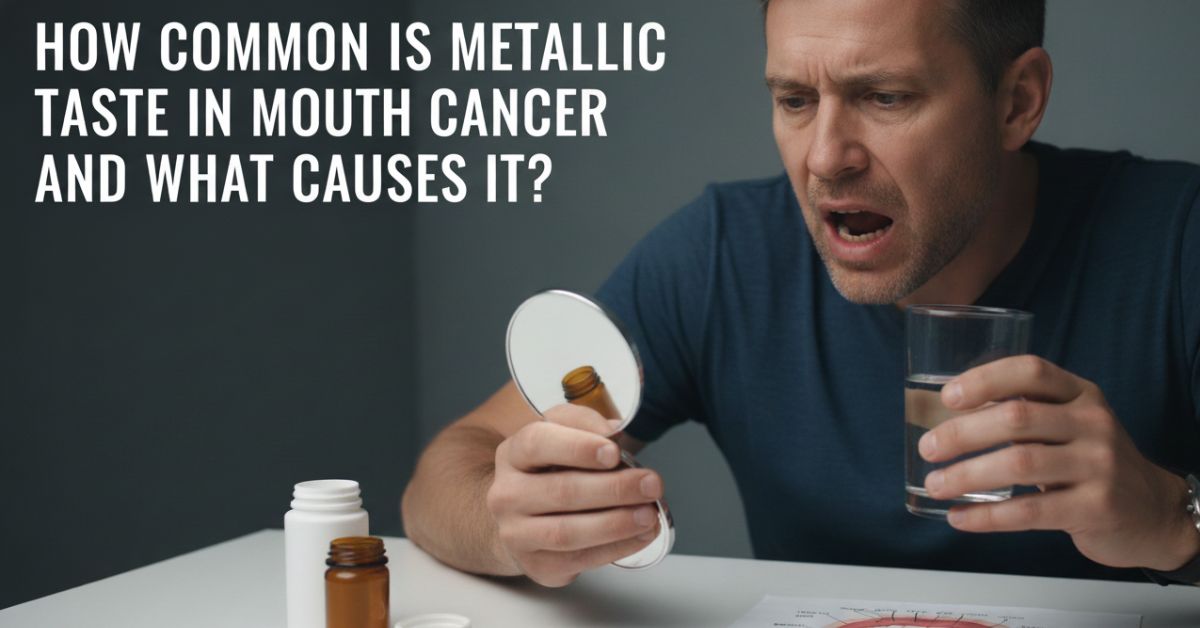Mouth cancer can affect the tongue, gums, lips, or the lining of the mouth. Common symptoms include sores, lumps, difficulty swallowing, and changes in speech. Some patients also experience metallic taste in mouth cancer early in the disease or during treatment, which can affect appetite and eating habits.
Recognizing metallic taste can be important. Changes in taste, such as bitter or metallic flavors, may signal oral health problems. While metallic taste alone does not confirm cancer, understanding its causes can help patients manage symptoms and seek timely medical care.
What Is Metallic Taste in the Mouth?

A metallic taste in the mouth, also called dysgeusia or parageusia, feels like metal or blood in the mouth. Patients may notice it after brushing, eating, or in the morning, and it often lingers.
Metallic taste differs from other taste changes, such as bitter, sour, or total loss of taste. These changes can affect nutrition, enjoyment of food, and overall quality of life. Many mouth cancer patients report metallic taste in mouth cancer symptoms during early or later stages.
How Common Is Metallic Taste in Mouth Cancer?
Metallic taste in mouth cancer is fairly common. Research shows that about 30 to 50 percent of patients experience changes in taste during cancer treatment or because of oral tumors. The frequency can vary depending on disease stage or treatment type.
It is also important to note that metallic taste can occur in other conditions, such as infections, poor oral hygiene, or vitamin deficiencies. Patients should observe symptoms carefully but avoid panic, as not all metallic taste indicates mouth cancer.
Causes of Metallic Taste in Mouth Cancer
Why do people with mouth cancer sometimes experience a metallic taste? Metallic taste in mouth cancer can happen for several reasons, including tumor growth, tissue damage, treatment effects, medications, infections, and nutritional deficiencies. Understanding the cause helps patients manage symptoms better.
1. Tumor Growth and Tissue Damage
Tumor growth in the mouth can affect taste buds or oral nerves, causing metallic taste. Tissue inflammation and damage may further alter taste perception. These changes are often subtle at first but can persist as the disease progresses.
Tumors may also interfere with saliva production, which is important for taste. Reduced saliva can make foods taste stronger or metallic. Understanding what causes metallic taste in mouth cancer helps patients differentiate between disease symptoms and treatment side effects.
2. Nutritional Deficiencies
Can nutrient deficiencies cause metallic taste in mouth cancer patients? Deficiencies in zinc, vitamin B12, or iron can alter taste perception. Cancer patients are particularly prone to these deficiencies due to reduced appetite, treatment side effects, or malabsorption.
Proper nutrition is essential for recovery. Incorporating strategies for boosting immune system after cancer supports overall health and may reduce taste changes. Monitoring diet and supplementing nutrients under medical guidance can help manage metallic taste.
3. Chemotherapy and Radiation Therapy

Many patients notice metallic taste after chemo. Chemotherapy can damage taste buds or change saliva composition. Radiation therapy to the mouth or throat has similar effects, often leading to persistent or temporary taste changes.
These adverse effects may decrease appetite and make eating less pleasurable. Certain foods or drinks may make the taste more noticeable. Patients can prepare and develop coping mechanisms by being aware that treatment may result in metallic taste.
4. Medications
Some medications used for pain, nausea, or infection in cancer management can cause metallic taste. Antibiotics, anti-nausea drugs, and certain pain relievers are common culprits.
The chemical or physiological changes caused by these medications can alter taste signals in the mouth. Patients should discuss symptoms with their doctor before changing medications, as adjustments can sometimes reduce metallic taste in mouth cancer symptoms.
5. Oral Hygiene Issues and Infections
Poor oral hygiene, gum disease, or mouth infections can contribute to metallic taste. Cancer and its treatments sometimes worsen these conditions, increasing discomfort.
Brushing, flossing, and regular dental check-ups can help. Controlling infections and inflammation may reduce metallic taste. Patients recovering from treatment should pay extra attention to oral care to maintain comfort and health.
When to Be Concerned?
Metallic taste alone does not always indicate cancer. However, it should be evaluated if persistent or accompanied by other symptoms like sores, lumps, or pain.
Temporary taste changes from treatment often improve, but ongoing metallic taste may require professional evaluation. Consulting a dentist or oncologist ensures proper diagnosis. Patients should track symptom patterns carefully to support effective care.
Coping With Metallic Taste

- Coping with a metallic taste can be frustrating, but simple steps can help. Keeping your mouth clean and staying hydrated often makes a noticeable difference and reduces discomfort.
- The metallic taste can be covered up by chewing sugar-free gum, using mints, or rinsing with flavored mouthwash. Eating may be more pleasurable and less stressful if you eat cold foods or meals with stronger flavors.
- Adjusting your diet to include foods you tolerate well helps maintain nutrition and appetite. Talking to a counselor or joining support groups can ease stress and worry, especially for cancer survivor anxiety.
Prevention and Early Detection
Regular dental check-ups and oral cancer screenings can help detect early changes. Self-examination of the mouth and noticing taste alterations may support early detection.
How can patients prevent or reduce the risk of taste changes and oral cancer? Avoiding tobacco, alcohol, and maintaining good oral hygiene reduces risks. Nutrition and lifestyle measures, including boosting the immune system after cancer, can improve recovery and minimize long-term taste disturbances.
Final Words
Metallic taste in mouth cancer is a common symptom of cancer. It can result from tumor growth, chemotherapy, radiation, medications, or nutritional deficiencies.
Recognizing symptoms early, practicing oral care, and adjusting diet help manage metallic taste. Persistent changes should be evaluated by healthcare professionals. Early detection and proper care improve outcomes and quality of life.
For reliable guidance and support for cancer patients, visit isurvivecancer, a trusted resource offering tips, information, and community support for those navigating life during and after cancer treatment.
Frequently Asked Question
Is a metallic taste the only sign of oral cancer?
No, treatments, infections, or dietary deficiencies can cause metallic taste. A doctor should be consulted if symptoms are persistent.
How long does a metallic taste last after cancer treatment?
It varies. Some recover within weeks, while others may experience it for months.
Are there home remedies to reduce metallic taste?
Good oral hygiene, cold or strong-flavored foods, sugar-free gum, and staying hydrated may help reduce discomfort.





